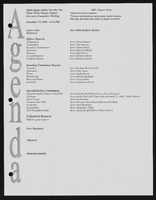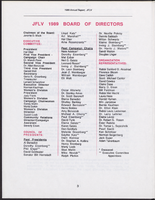Search the Special Collections and Archives Portal
Search Results

Alpha Kappa Alpha Sorority, Theta Theta Omega Chapter executive committee agendas
Date
Archival Collection
Description
From the Alpha Kappa Alpha Sorority, Incorporated, Theta Theta Omega Chapter Records (MS-01014) -- Chapter records file.
Text
Mike O'Callaghan Professional Papers
Identifier
Abstract
The Mike O'Callaghan Professional Papers (1943, 1968-2004) mainly consist of research files gathered by Mike O'Callaghan in his post-political capacity as executive editor of the Las Vegas Sun as well as owner and publisher of the Henderson Home News, Boulder City News, and Green Valley News. The papers also contain handwritten and typewritten drafts of O'Callaghan's "Where I Stand" article for the Las Vegas Sun, along with his reporter's notebooks, monthly planners, and photographic prints. The research files cover a wide variety of topics, including but not limited to environmental issues; nuclear waste; state and local politics; military and veterans affairs; foreign relations including Israel, Iraq, and Korea; and education. The collection also contains copies of speeches given by O'Callaghan as the 23rd Governor of Nevada between 1971 and 1979, some of which contain handwritten notations.
Archival Collection
DeeDee Jasmin oral history interview
Identifier
Abstract
Oral history interview with DeeDee Jasmin conducted by Claytee White on March 19, 1998 for the Women's Research Institute of Nevada (WRIN) Las Vegas Women Oral History Project. Jasmin opens the interview discussing her life growing up on the Westside of Los Angeles, California. Jasmin goes on to discuss her pursuit of a dance career as a youth. Jasmin got her first big break playing in the comedy musical Sugar Hill and after her high school years she starred in movies before moving to Las Vegas, Nevada in 1955. Jasmin describes her excitement meeting East Coast dancers during her stay in Las Vegas. Jasmin also discusses her interactions with the many famous actors, dancers, singers, and musicians she met during her career.
Archival Collection
Alice Key oral history interview
Identifier
Abstract
Oral history interview with Alice Key conducted by Claytee D. White on February 17 and March 24, 1997 for the Women's Research Institute of Nevada (WRIN) Las Vegas Women Oral History Project. In this interview Alice Key discusses being a chorus line dancer at the Cotton Club in Culver City, California and then moving to Las Vegas, Nevada after her dancing career ended. She then talks about working as a reporter, her involvement with the civil rights movement in Las Vegas, and creating the first all-black television show in the country: Talk of the Town.
Archival Collection
Kim Krantz oral history interview
Identifier
Abstract
Oral history interview with Kim Krantz conducted by Joyce (Marshall) Moore on February 26, 1996 for the Women's Research Institute of Nevada (WRIN) Las Vegas Women Oral History Project. Krantz begins her interview discussing her transition from an east coast dancer to a Las Vegas, Nevada dancer. Krantz discusses the performing scene at the time and the general distaste dancers had for showgirls. Krantz goes on to discusses the details of nudity in performances and the relationships show directors like Harold Minsky and Donn Arden had with their performers. Krantz also discusses her experiences as a dancer and her opinions about the treatment of African American dancers.
Archival Collection
Jeanne Russell Janish Photograph Collection
Identifier
Abstract
The Jeanne Russell Janish Photograph Collection (1918-1974) consists of 48 black-and-white and color photographic prints that feature Janish's family, her husband Carl Janish, family homes and pets, and travel photographs from the United States, China, and South America.
Archival Collection
University of Nevada, Las Vegas ROTC Records
Identifier
Abstract
The University of Nevada, Las Vegas ROTC Records are comprised of administrative files and photographic prints from the University of Nevada, Las Vegas (UNLV) Army Reserve Officers Training Corps (ROTC) from its inception in 1980 to 1991. The collection includes photographs of cadet activities as well as Army ROTC recruitment materials.
Archival Collection
William E. Ferron Family Papers
Identifier
Abstract
The William E. Ferron Family Papers (1917-1976) are comprised of materials that document the lives of the Ferrons, one of the pioneer families of early Las Vegas, Nevada. It includes biographical material, speeches, and ephemera on patriarch William E. Ferron and his wife, Mary Ruth Cooper Ferron, as well as their two daughters, Barbara Ferron Doyle and Shirley Elizabeth Ferron Swanson.
Archival Collection
Rodel Fuentes oral history interview
Identifier
Abstract
Oral history interview with Rodel Fuentes conducted by Tracy Fuentes on December 4, 2021 for Reflections: The Las Vegas Asian American and Pacific Islander Oral History Project.
Rodel Fuentes tells stories of his upbringing in Manila, Philippines, where he was raised in a shared family home amongst his parents, siblings, aunts, and uncles. He talks about his parents' immigration to the United States and how he later joined them in Los Angeles, California where he met and married his wife. Rodel Fuentes shares the couple's decision to move to Las Vegas, Nevada, his work at Dunn Edwards paint company, and how he became a licensed general contractor and real estate agent where he now owns his own company. Rodel Fuentes discusses his thoughts on Las Vegas' diversity, affordability, restaurants, and Asian community. He also talks about experiencing anti-Asian hate, worsened by misconceptions and discrimination that came from the COVID-19 pandemic.
Archival Collection

